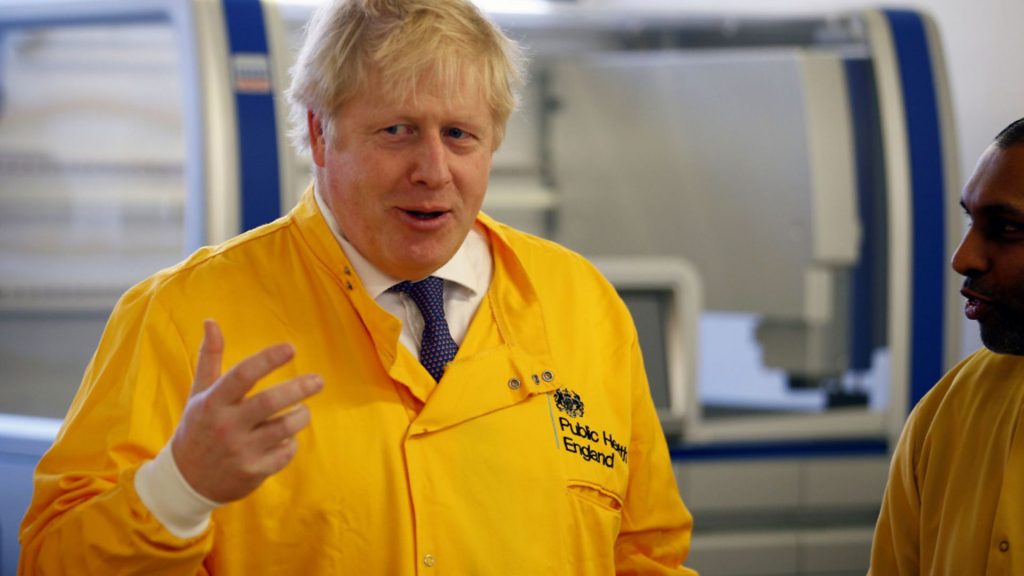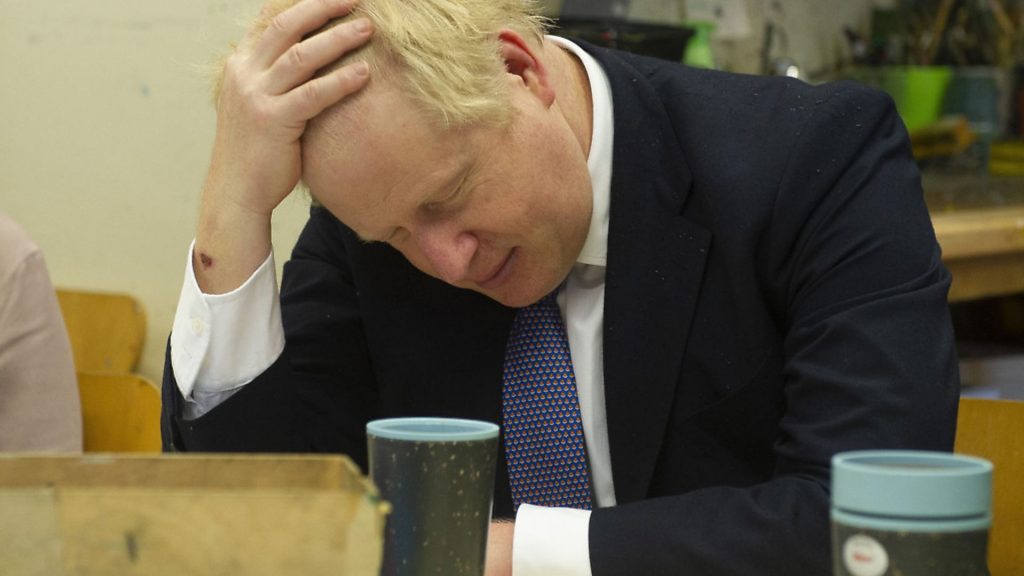
MICHAEL WHITE on how the coronavirus has finally forced Boris Johnson back into the spotlight and in front of the television cameras.
Have you read or heard anyone dismissing rapidly-expanding precautions being taken to limit the spread of coronavirus as another Project Fear? Me neither. Apart from China’s totalitarian instinct to suppress the initial outbreak the nearest we got to it was when Donald (“no need to panic”) Trump said that fears of a pandemic were a Democrat-inspired “hoax”, designed to weaken his re-election hopes by pole-axing stock markets. Precautions can soften the blow, as happened after the referendum.
Events and science forced even “Know Nothing” Trump to back off the hoax stuff, to try and govern for once, instead of perpetually campaigning. As the economist Paul Krugman wittily noted, this is the first crisis of his presidency that the notorious germophile didn’t cause himself. It’s a good point in a week when the green light which the White House casually gave his Turkish fellow-populist Recep Tayyip Erdogan risks triggering a Syrian war with Russia, just when he’s falling out with his European Nato allies over refugees.
Economic crises and wars tend to happen when diplomatic trust is low and nationalist fever high, when wary allies misread signals and opportunist rivals spot a chance to exploit a neighbour’s weakness while the wider world is distracted by something that seems more urgent. Like coronavirus and its economic impact on Trump’s election chances (and the rest of us). Like now.
Yet fate has capriciously decreed that this turns out to be the week when Global Britain has opened its speed-dating negotiations for a new, very loose trade agreement with the EU. Boris Johnson’s born-again chief negotiator David Frost gave his team of 100 a pep talk and a Union flag lanyard each before they sat down with Michel Barnier – yes, him again – for a two-hour opening skirmish. Think of yourselves as “sovereign equals” in the national interest, when dealing with the EU27, he told them. “We’re prepared to walk away in June,” added No.10.
Have your say
Send your letters for publication to The New European by emailing letters@theneweuropean.co.uk and pick up an edition each Thursday for more comment and analysis. Find your nearest stockist here or subscribe to a print or digital edition for just £13. You can also join our readers' Facebook group to keep the discussion and debate going with thousands of fellow pro-Europeans.
Whatever our private fears that this can only end badly for a 66 million-strong UK pitched against veteran negotiators for a 440 million-strong bloc, we must wish them luck because they’re the only team we’ve got or are likely to have for the foreseeable future. Even though the furniture is crashing down around the Johnson administration and the PM has had to express his “full confidence” – always ominous words – in Priti Patel, there ain’t no cavalry about to ride over the hill to rescue us.
Certainly not any US cavalry of the kind that saved the wagon train in Hollywood cowboy movies. By further coincidence Monday was also the day when ministers set out their opening bid for “an ambitious and comprehensive” trade deal with the US, 12 months after Trump’s economic nationalists did the same. The Leave camp has blithely talked before and since the referendum about using such deals with the wider world – the old Commonwealth, South Korea and Japan too – to make up for trade losses in Europe, 49% of our total in 2018. Yet the position paper from Liz Truss, the international trade secretary, put the gain at a very modest £3.4 billion after 15 years.
That’s 0.16% of UK GDP, “less than the annual contribution of Brentwood or Bury”, as the Guardian’s economic correspondent Richard Partington put it. Failure to strike a deal with Brussels – a scenario for which the government now claims to be actively preparing – would leave us 7.6% worse off than the status quo over 15 years (minus 4.9% under a Canada-style deal), according to the official impact assessment published in 2018. Non-economist David Frost derides its pessimism. But it is an exercise that ministers have not risked repeating.
Truss’s downbeat assessment has the merit of likely honesty – expert outsiders concluded – so was largely ignored by Brexit media cheerleaders. “Britain could be served up GM ‘Frankenfood’ in US trade deal” was the Mail’s headline, itself a concession to a reality previously ducked. Since the paper’s campaign against Dr Frankenstein’s produce was largely misconceived that’s no tragedy in itself. But Britain currently has a trade surplus with the US – £57.4bn of exports against £51.1bn of goods coming in – and Team Trump is as mercantilist as France in its view of trade: it’s a zero sum game. For me to win, you must lose. Think costlier US pharmaceuticals and those swimming pool chickens.

So watch out.
Johnson says he intends to “drive a hard bargain” and ministers say that UK-made cars and even farming, as well as financial services, could benefit from a more liberal regime with the US. But tariffs are already low. What’s more, Liam Fox (who used to do Truss’s job before being dispatched to the Westminster abattoir) points out that a great deal of US financial service regulation is managed at state level. It’s another reason, incidentally, why Joe Biden shouldn’t be the Democrats candidate to fight Trump in November. From 1973 to 2009 he was a senator from Delaware, “the company state” as Ralph Nader once called it, and is compromised by its notoriously pro-corporate tax regime.
At least US financial regulators (and the tax man) have teeth, staff and a fearsome capacity to throw the book at those they catch cheating, a far higher conviction-plus-jail rate than our own Serious Fraud Office (SFO), underfunded and demoralised by the loss of another big case the other day. But money and legal powers are only part of the battle for effective regulation and accountability which Trump is busy undermining – with Mini-Me Boris in his wake.
In its battle to cow the BBC and the non-compliant media, more serious and systematic than yet widely appreciated, No.10 explicitly invokes the Trump model of aggressive partisanship and denigration. It has seen it offer excluded broadcasters its own sanitised TV footage of the Boris message, untroubled by awkward questioning. But can the strategy hold against the unruly tide of events? This has been the week when COBRA – Cabinet Office Briefing Room A sounds less impressive – is grappling with growing fear of a global pandemic and recurring floods in voters’ cherished homes.

Even Boris has put in an appearance in COBRA and – finally – at Tuesday’s press conference, though by rights the poor man should still be on paternity leave in Mustique or Chevening. Yes, this was also the week when we learned he is to become a father once again. After privacy tussles with the tabloids, his partner Carrie Symonds’ pregnancy, and the couple’s engagement, was confirmed, having been suspected since she slipped away from the Remembrance Day ceremony in November. I am assured by sources I trust that the timing was coincidental, not deployed merely to distract media attention from the Patel case, though it did.
That’s a relief since we are dealing here with some very cynical people. I’m sure Carrie remembers that it was Jimmy Goldsmith, Priti Patel’s old Referendum Party boss and a natural Bullingdon Club hero, who observed that “when a man marries his mistress (as he eventually did Zac’s mother) he creates a vacancy.” These people aren’t like most of us, they can usually walk away, leaving others to clean up the mess, as Boris has done so often in his public and private life.
These days his public and private misconduct gets the endorsement of the Borisgraph. Once-stiff-necked and disapproving of sexual impropriety, its coverage has been simpering. I prefer to treasure the Sunday Times passing observation that our PM will soon have “at least six children”, a point on which the Sunday Tel was vague. Think about that casual evasiveness. It’s the same with hospitals (“at least six new ones”) with extra police officers (“at least six more” – or was it 60,000?) and with disputed trade barriers down the Irish Sea. The details don’t matter and the consequences are for other people.
This is faux-aristocratic government of the pre-democratic era, a kind we have not seen since the 19th century. Much of the media goes along with it, bending the knee to power. Plenty of BBC outlets have made peace on No.10’s terms, so I am told, rewarded with reduced sanctions and a junior minister allowed on air. Trump, Erdogan and other rich, illiberal populists have shown how they can traduce the facts with a cowed media, marginalised parliaments and nobbled courts. But for how long if the facts stubbornly undermine their claims?
Climate change is the biggest such inconvenient fact, coronavirus the most urgent. Brexit hovers in between, not quite the existential threat to Britain – sorry, to England – that its most diehard opponents claim, but potentially very serious for vulnerable voters on both sides if badly handled. Johnson’s Greenwich speech did not lack a blustering pirate confidence, though he may have popped a Valium from Dominic Cummings, his Leninist disruptor. At least as startling for the same reason was negotiator Frost’s debut speech at ULB Brussels university last month.
No clever tactical positioning from us, Frost declared. The Brits are merely coming to claim the right to behave like an independent country that “every other non-EU country in the world has” and exercise sovereignty over our laws, money and trade. Why, because “we believe sovereignty is meaningful and what it enables us to do is to set out our rules for our own benefit” in ways that pooled sovereignty on the EU model – merely influencing the rule-making process – does not.
Of course that means diverging from EU standards where it suits us, often to achieve better ones (“not minimalist outcomes”), that’s the whole point. He cited agriculture where EU rules have never suited us. He might have added fish where Frost and Barnier are squaring up to call each other’s bluff. But what Frost really has his eye on is new sectors – that’s biotech, AI and the like – where a sovereign UK can be nimbler than the 27, where it can correct its own mistakes faster than a bureaucratic super-state reluctant to admit it ever makes them. “Even if there is a short term cost it will be overrun rapidly by the huge gains” of having your own policy, Frost asserted.
Wow! These are interesting points, worth debating. But there are always trade-offs between independence and access. As for his tone, the breezy confidence of a highly political speech from a supposedly neutral civil servant was startling. I bet Patel wouldn’t have sacked him. Frost sounded very, dare I say it, French. Yet, as his speech revealed, he learned his Euro-scepticism as a UK official in Brussels in the 1990s. He arrived as a conventional Whitehall high-flyer – Nottingham (private) High School, a French and medieval history degree from Oxford, fast-track postings to become private secretary to uber-mandarin and Remain hero, Lord John Kerr. Only there, among the frites and moules, did he rebel against the emerging trans-national concept.
Frost also rejected the “sweet spot” argument (I have argued for it myself) that Britain could retain the economic benefits while rejecting political integration. Britain joined the EU mostly for economic reasons but never accepted the political package and would always resist it. Best off out, he concluded. Though Frost mocks gloomy economists who don’t get all this, I wish this history graduate better understood the history from a medievalist perspective, all layered sovereignty owed ambiguously to popes and princes. He overrates Edmund Burke, as a philosopher, not an upmarket MP and journo, and overrates the EU as “the greatest revolution in European government since 1648”.
Oh really? I assume that is a reference to the Treaty of Westphalia’s assertion of the primacy of modern nation states. So much for the French Revolution and the Enlightenment, eh! So much for Bismarck’s right-wing welfare state. This is Tory romanticism of the kind Jake Rees-Mogg likes to peddle, the late Roger Scruton too. You expect shepherds and gambolling nymphs to make an appearance at any moment, as in an idealised pre-revolutionary ‘girl on a swing’ painting by Fragonard. It can look attractive if you ignore those sullen, hungry peasants whom the French court painter didn’t have room to include. They’re holding pitchforks just out of sight, proto-gilets jaunes or Labour defectors in “red wall” seats and they’re not easily fobbed off any more.
Researchers at the University of Amsterdam revealed this week that their Populist polling shows a doubling of support for Euro-sceptic parties across the bloc since 1992, though support for the EU is also at record levels, suggesting – to me at least – that five in six Europeans still remember the nasty alternatives better than we do. That’s the challenge which Boris, Frosty and Co downgrade when they insist that it will be fine on the night, trade and production chains, summer holidays and security, even – this week’s eye-catching rejection of the European Arrest Warrant (EAW). What’s next, the (pre-EU) European Convention on Human Rights (ECHR)? Maybe, if Patel hangs on.
It all seems reckless unless it just means that Boris’s Brexit donors plan to abscond to their Tuscan villas, safe from UK law, if things go wrong. Things already seem to be wonky for that Brexiteer boast that a sovereign UK can build its own GPS navigation system now it’s excluded from the EU’s Gallileo. There’s not enough money to fund it. Who knew? It’s not Project Fear to point this out. Yet another worry for trainee chancellor Rishi Sunak, calculating the possible economic cost of coronavirus disruption ahead of his March 11 budget with ousted Sajid Javid making unhelpful tax suggestions (“2p off income tax”) from the wings.
At a time when the need for international cooperation and trust is at a premium, we see similar Brexity thought patterns at work over coronavirus and that other challenge, climate change. Pro-Brexit, free market libertarian advocates like science writer and Brexit peer Matt Ridley argue in the Sunday Borisgraph that individuals are best placed to combat Covid-19 by washing their hands and other sensible precautions. Don’t let the lefties use it as an excuse to make a state grab for power, Lord Ridley warns, much as he does over Brexit and climate.
Up to a power, Lord Copper. It can only be the organising power of the state, coercion included if necessary, that will save us from the worst of whatever nightmare might be ahead. Ditto the climate change emergency. Motorists won’t vote to ban diesel cars that pollute our lungs, will they? Any more than Volkswagen would voluntarily have owned up to fiddling the emission figures. Markets won’t stop the Severn flooding either.
The need to reassure the public that its pandemic plans are robust enough to cope with an 80% infection rate – 1% mortality – has already forced a reluctant Boris back on TV. Who knows better than him what damage media irresponsibility can do? Another thing we learned this week was that before Margaret Thatcher made her fateful “No, no, no” statement to MPs in autumn 1990 – I was present – she’d been reading some fake news filed by reporter Boris from Brussels. If only we’d known. She was out in a month.
Health precautions may prove excessive, but no one invokes Project Fear now. Sir Philip Rutnam’s lawsuit against Patel and sacked spad’s Sonia Khan’s against Dominic Cummings lap around the sandbags at No.10. So does the rumbling case of Jennifer Arcuri’s cash-for-cuddles and much else. As for the real sandbags on the Severn and Trent, the Daily Mail, not so easily cowed, remains furious: “Where’s Boris?”
What a time to test the limits of go-it-alone sovereignty under such a casually inexperienced and mistrusted leadership.









